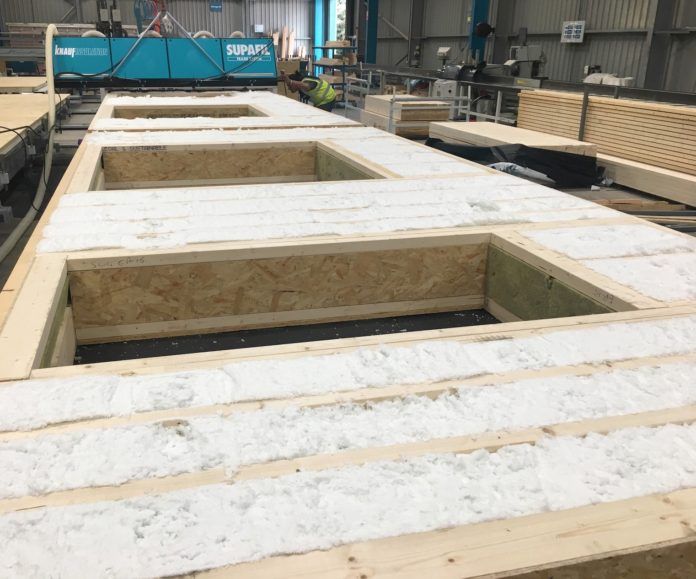
Four years ago, sustainable developer Citu set out to create homes 10 times more energy efficient than typical UK houses. To do this, the company invested in a state-of-the-art production facility, where all the components for its properties are built offsite.
Thermal performance is critical to energy efficiency. Citu wanted to go far beyond the regulations to achieve wall build-ups with an extremely low U-value of just 0.10W/m2K. This is at least three times better than the U-value achieved in most newbuild homes and 15 times better than older houses.
Adding offsite capability
Citu turned to Knauf Insulation for advice and support in developing the offsite capability required for this level of thermal performance.
Knauf Insulation’s technical support team undertook extensive calculations and recommended the Blowing Plate Insulation System to install Supafil Frame – a high performance, non-combustible blowing wool.
Supafil Blowing Wool lends itself to offsite production because it completely fills the cavity, without any voids even around complex penetrations – something that can occur when insulation slabs or rolls are cut to size. It is also a dry process, so operatives are not exposed to any harmful chemicals and it doesn’t require a dedicated production line.
Instead, the system comprises a blowing machine and a filling plate. The system is modular, allowing for phased investment. Citu opted to install the blowing machine in phase one, which allowed them to manually fill the panels. Phase two saw the addition of the blowing plate, semi-automating the process.
Supafil Frame can be run by a single operator, fits easily into the existing production line, and can even be moved quickly and swiftly to other areas in the manufacturing facility, depending on Citu’s volume capacity requirements.
Knauf Insulation’s technical support team provided full training and support during each phase of installation.
Insulating the panels
Citu homes are manufactured from wooden panels with a 300mm cavity. The blowing plate is positioned over the panel completely covering the cavity. Supafil is then blown into the wooden frame to the specific parameters of each panel. All cavities are filled to the correct thickness; something that has been carefully calculated and tested by the Knauf Insulation technical support team to ensure settlement does not occur. And because the machine is programmed to install the exact quantity of insulation required, there’s no waste.
Supafil is a high performance Blowing Wool. It is non-combustible with Euroclass A1 Reaction to Fire Classification rating, as well as providing excellent thermal and acoustic performance. It contains a silicone-based additive to ensure it is water repellent.
As well as providing excellent thermal performance, Supafil has great sustainability credentials. Knauf Insulation’s glass mineral wool contains up to 80% of recycled content. This reduces the amount of virgin materials used and prevents around 60,000 tonnes of glass a year going to landfill.
Knauf Insulation has also invested in advanced compression packaging. This means there is less packaging used, so fewer lorries on the roads, thereby leading to a reduction in transport carbon emissions. All of which helps to support Citu’s goal that every home should be carbon zero to manufacture.



